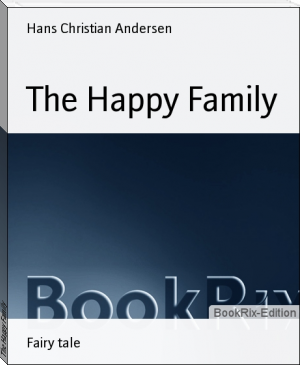The Shadow - Hans Christian Andersen (best e reader for academics txt) 📗

- Author: Hans Christian Andersen
Book online «The Shadow - Hans Christian Andersen (best e reader for academics txt) 📗». Author Hans Christian Andersen
THE SHADOW
It is in the hot lands that the sun burns, sure enough! there the people become quite a mahogany brown, ay, and in the HOTTEST lands they are burnt to Negroes. But now it was only to the HOT lands that a learned man had come from the cold; there he thought that he could run about just as when at home, but he soon found out his mistake.
He, and all sensible folks, were obliged to stay within doors—the window-shutters and doors were closed the whole day; it looked as if the whole house slept, or there was no one at home.
The narrow street with the high houses, was built so that the sunshine must fall there from morning till evening—it was really not to be borne.
The learned man from the cold lands—he was a young man, and seemed to be a clever man—sat in a glowing oven; it took effect on him, he became quite meagre—even his shadow shrunk in, for the sun had also an effect on it. It was first towards evening when the sun was down, that they began to freshen up again.
In the warm lands every window has a balcony, and the people came out on all the balconies in the street—for one must have air, even if one be accustomed to be mahogany!* It was lively both up and down the street. Tailors, and shoemakers, and all the folks, moved out into the street—chairs and tables were brought forth—and candles burnt—yes, above a thousand lights were burning—and the one talked and the other sung; and people walked and church-bells rang, and asses went along with a dingle-dingle-dong! for they too had bells on. The street boys were screaming and hooting, and shouting and shooting, with devils and detonating balls—and there came corpse bearers and hood wearers—for there were funerals with psalm and hymn—and then the din of carriages driving and company arriving: yes, it was, in truth, lively enough down in the street. Only in that single house, which stood opposite that in which the learned foreigner lived, it was quite still; and yet some one lived there, for there stood flowers in the balcony—they grew so well in the sun's heat! and that they could not do unless they were watered—and some one must water them—there must be somebody there. The door opposite was also opened late in the evening, but it was dark within, at least in the front room; further in there was heard the sound of music. The learned foreigner thought it quite marvellous, but now—it might be that he only imagined it—for he found everything marvellous out there, in the warm lands, if there had only been no sun. The stranger's landlord said that he didn't know who had taken the house opposite, one saw no person about, and as to the music, it appeared to him to be extremely tiresome. "It is as if some one sat there, and practised a piece that he could not master—always the same piece. 'I shall master it!' says he; but yet he cannot master it, however long he plays."
* The word mahogany can be understood, in Danish, as having two meanings. In general, it means the reddish-brown wood itself; but in jest, it signifies "excessively fine," which arose from an anecdote of Nyboder, in Copenhagen, (the seamen's quarter.) A sailor's wife, who was always proud and fine, in her way, came to her neighbor, and complained that she had got a splinter in her finger. "What of?" asked the neighbor's wife. "It is a mahogany splinter," said the other. "Mahogany! It cannot be less with you!" exclaimed the woman—and thence the proverb, "It is so mahogany!"—(that is, so excessively fine)—is derived.
One night the stranger awoke—he slept with the doors of the balcony open—the curtain before it was raised by the wind, and he thought that a strange lustre came from the opposite neighbor's house; all the flowers shone like flames, in the most beautiful colors, and in the midst of the flowers stood a slender, graceful maiden—it was as if she also shone; the light really hurt his eyes. He now opened them quite wide—yes, he was quite awake; with one spring he was on the floor; he crept gently behind the curtain, but the maiden was gone; the flowers shone no longer, but there they stood, fresh and blooming as ever; the door was ajar, and, far within, the music sounded so soft and delightful, one could really melt away in sweet thoughts from it. Yet it was like a piece of enchantment. And who lived there? Where was the actual entrance? The whole of the ground-floor was a row of shops, and there people could not always be running through.
One evening the stranger sat out on the balcony. The light burnt in the room behind him; and thus it was quite natural that his shadow should fall on his opposite neighbor's wall. Yes! there it sat, directly opposite, between the flowers on the balcony; and when the stranger moved, the shadow also moved: for that it always does.
"I think my shadow is the only living thing one sees over there," said the learned man. "See, how nicely it sits between the flowers. The door stands half-open: now the shadow should be cunning, and go into the room, look about, and then come and tell me what it had seen. Come, now! Be useful, and do me a service," said he, in jest. "Have the kindness to step in. Now! Art thou going?" and then he nodded to the shadow, and the shadow nodded again. "Well then, go! But don't stay away."
The stranger rose, and his shadow on the opposite neighbor's balcony rose also; the stranger turned round and the shadow also turned round. Yes! if anyone had paid particular attention to it, they would have seen, quite distinctly, that the shadow went in through the half-open balcony-door of their opposite neighbor, just as the stranger went into his own room, and let the long curtain fall down after him.
Next morning, the learned man went out to drink coffee and read the newspapers.
"What is that?" said he, as he came out into the sunshine. "I have no shadow! So then, it has actually gone last night, and not come again. It is really tiresome!"
This annoyed him: not so much because the shadow was gone, but because he knew there was a story about a man without a shadow.* It was known to everybody at home, in the cold lands; and if the learned man now came there and told his story, they would say that he was imitating it, and that he had no need to do. He would, therefore, not talk about it at all; and that was wisely thought.
*Peter Schlemihl, the shadowless man.
In the evening he went out again on the balcony. He had placed the light directly behind him, for he knew that the shadow would always have its master for a screen, but he could not entice it. He made himself little; he made himself great: but no shadow came again. He said, "Hem! hem!" but it was of no use.
It was vexatious; but in the warm lands everything grows so quickly; and after the lapse of eight days he observed, to his great joy, that a new shadow came in the sunshine. In the course of three weeks he had a very fair shadow, which, when he set out for his home in the northern lands, grew more and more in the journey, so that at last it was so long and so large, that it was more than sufficient.
The learned man then came home, and he wrote books about what was true in the world, and about what was good and what was beautiful; and there passed days and years—yes! many years passed away.
One evening, as he was sitting in his room, there was a gentle knocking at the door.
"Come in!" said he; but no one came in; so he opened the door, and there stood before him such an extremely lean man, that he felt quite strange. As to the rest, the man was very finely dressed—he must be a gentleman.
"Whom have I the honor of speaking?" asked the learned man.
"Yes! I thought as much," said the fine man. "I thought you would not know me. I have got so much body. I have even got flesh and clothes. You certainly never thought of seeing me so well off. Do you not know your old shadow? You certainly thought I should never more return. Things have gone on well with me since I was last with you. I have, in all respects, become very well off. Shall I purchase my freedom from service? If so, I can do it"; and then he rattled a whole bunch of valuable seals that hung to his watch, and he stuck his hand in the thick gold chain he wore around his neck—nay! how all his fingers glittered with diamond rings; and then all were pure gems.
"Nay; I cannot recover from my surprise!" said the learned man. "What is the meaning of all this?"
"Something common, is it not," said the shadow. "But you yourself do not belong to the common order; and I, as you know well, have from a child followed in your footsteps. As soon as you found I was capable to go out alone in the world, I went my own way. I am in the most brilliant circumstances, but there came a sort of desire over me to see you once more before you die; you will die, I suppose? I also wished to see this land again—for you know we always love our native land. I know you have got another shadow again; have I anything to pay to it or you? If so, you will oblige me by saying what it is."
"Nay, is it really thou?" said the learned man. "It is most remarkable: I never imagined that one's old shadow could come again as a man."
"Tell me what I have to pay," said the shadow; "for I don't like to be in any sort of debt."
"How canst thou talk so?" said the learned man. "What debt is there to talk about? Make thyself as free as anyone else. I am extremely glad to hear of thy good fortune: sit down, old friend, and tell me a little how it has gone with thee, and what thou hast seen at our opposite neighbor's there—in the warm lands."
"Yes, I will tell you all about it," said the shadow, and sat down: "but then you must also promise me, that, wherever you may meet me, you will never say to anyone here in the town that I have been your shadow. I intend to get betrothed, for I can provide for more than one family."
"Be quite at thy ease about that," said the learned man; "I shall not say to anyone who thou actually art: here is my hand—I promise it, and a man's bond is his word."
"A word is a shadow," said the shadow, "and as such it must speak."
It was really quite astonishing how much of a man it was. It was dressed entirely in black, and of the very finest cloth; it had patent leather boots, and a hat that could be folded together, so that it was bare crown and brim; not





Comments (0)